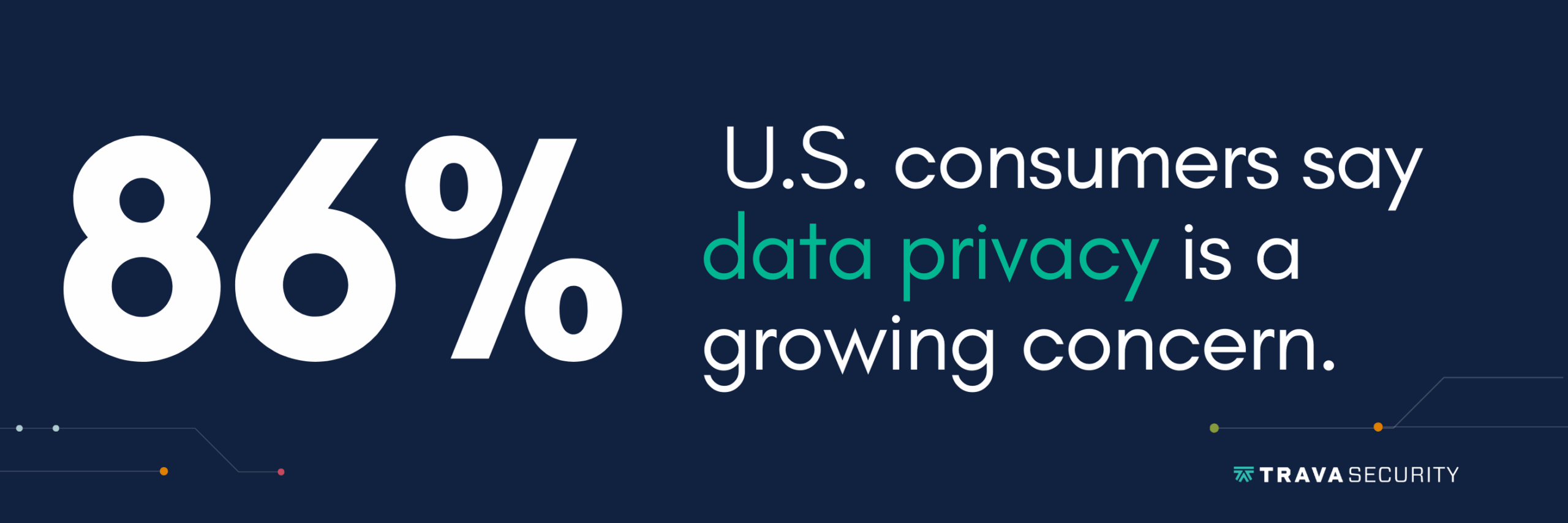Last updated: Septemeber 19, 2025
Data privacy may be worth more to your business than you might think. An increasing number of consumers and B2B clients value it in the companies they partner with. Upgrading your privacy offerings could help you appeal to more clients, win more business, and retain loyalty.
But not all strategic cybersecurity investments deliver equal value. If you want to optimize for data privacy and protect your bottom line in the process, partnering with a data privacy consulting service could be the right move for you.
These companies can speed up your implementation timeline, help you avoid costly rework, and install the infrastructure you need to hit your cybersecurity compliance goals. Keep reading to learn more about why data privacy is worth your attention in 2025.
Why does data privacy matter?
According to KPMG, 86% of U.S. consumers say data privacy is a growing concern.1 This means your business risks alienating a significant portion of the population through underinvestment. But that’s only part of the equation.
Corporations also care a great deal about data privacy. If your company appears to take it less seriously than its competitors, you could miss out on deals, lose existing clients, and struggle to gain market share.
Here’s a closer look at why data privacy is so important.

What role does security frameworks have on data privacy?
Security frameworks like the European Union’s GDPR (General Data Protection Regulation) and California’s CCPA (Consumer Privacy Act) play a crucial role in this field. These are the regulations that your company will need to comply with to avoid costly fines and reputational damage.
Frameworks create standardized processes for data collection, usage, storage, and deletion. They provide guidance in securing sensitive data and act as proof of compliance when your company tries to win new business.
You may need to comply with several data privacy frameworks, depending on your operational footprint. A company must follow binding frameworks in the jurisdictions where it sells its products. So, if you operate in the EU or California, you are likely required to follow the GDPR or CCPA.
Should You Use Data Privacy Consulting Services?
It may be worth partnering with a consulting service when you’re ready to improve your company’s data privacy practices. These security experts can review your current processes, suggest improvements, and help you stay compliant with key frameworks in your region.
But do you really need a consultant, or can you do the job internally?
What does a data privacy consultant do?
A data privacy consultant can help your business by:
- Performing privacy-focused risk assessments like data mapping and gap analysis
- Developing privacy policies and data handling procedures from scratch or reviewing existing ones
- Ensuring compliance with key frameworks like GDPR, CCPA, HIPAA, and SOC 2
- Providing documentation to demonstrate compliance to whomever you need
- Delivering ongoing support to help you stay compliant as laws evolve
You can hire an expert to help with as many of these tasks as you want. The best fit for your business will vary based on its current processes and how far away those are from meeting critical compliance requirements.

DIY vs. Outsourcing
Many companies have to choose between improving data privacy internally and hiring an external consultant. Do you have the necessary expertise available internally? If not, partnering with a consultant is probably the right choice.
Outsourcing may make more sense even if you do have the necessary internal expertise. It gives you on-demand access to a high-level data privacy team that can provide whatever support you need to move forward. You can reach your compliance goals faster, save money long-term, and get the custom policies you need to stand out from your competition. This can add up to very real business benefits.
Consider the following table, comparing DIY vs. outsourced data privacy:
| DIY | Hiring a Consultant |
| Often time-consuming and confusing | A clear, guided process |
| Unsophisticated processes risk accidental noncompliance | Relies on proven frameworks and deep industry knowledge to reduce risk |
| Typically uses generic policy templates | Features custom policies, purpose-built for your business |
| Limited internal expertise for ongoing support | Deep regulatory experience for powerful, lasting support |
This isn’t to say that DIY can never work, but it’s probably only worth considering if your company has a high level of internal cybersecurity expertise. Even then, it may not be the best use of that team’s time and talent.
How to find your ideal data privacy consultant?
If you think hiring a consultant is the right move for your company, the next step is finding the right fit. Here are some factors to look for when screening options:
- Direct experience with your industry and the relevant frameworks
- Experience working with companies of a similar size
- Transparency about pricing and timeline
- Strong documentation and policy creation skills
- Availability of ongoing support
- Ability to customize services and recommendations to match your unique needs
As you compare options, be sure to ask for case studies and recommendations from past clients. Experts who truly specialize in data privacy consultancy will have no problem providing these. A company that can’t back up its words with concrete examples may be another kind of cybersecurity agency masquerading as a data privacy expert. This is why it’s important to compare multiple options before signing any contracts.
Protecting Your Business With a Data Privacy Consultant
Data privacy consulting services can help your company stay compliant and win new business. They offer targeted support with critical industry frameworks and can create personalized policies designed for the unique needs of your business.
Partnering with a data privacy consulting firm can help you avoid bad headlines, retain client loyalty, and set the stage for growth. If you’re ready to get started, Trava Security is here to help. We offer expert-guided compliance, help with documentation, and tailored privacy solutions to help you adhere to the GDPR, CCPA, and other standards. From ongoing support to one-time consultations, we’re happy to assist wherever you need it.
So, why wait to get started? Check out our privacy consulting services today to learn more about how Trava can support you while you work toward your goals.
Sources
- Corporate data responsibility: Bridging the consumer trust gap. (n.d.) KPMG.
- Cost of a data breach 2024: Financial industry. (August 2024.) IBM.
- T-Mobile data breach damaging to reputation, industry says. (May 2023.) Capacity Media.
Data Privacy Consulting FAQs
What does a data privacy consultant do?
Data privacy consultants help companies understand and comply with privacy regulations like GDPR, CCPA, and HIPAA. They’re experts on these frameworks and the steps companies must take to meet them.
Your work with a privacy consultant could be a one-time assessment of how your organization collects, stores, processes, and shares user data. This could involve services like data mapping, risk assessments, staff training, and policy development.
Some companies also develop ongoing relationships with data privacy consultants. These ongoing services can help your business stay up to date with new requirements, optimize over time, and deliver more value to customers.
How is data privacy compliance different from security compliance?
Data privacy compliance is closely related to security compliance. Both processes help organizations protect sensitive information.
Data privacy compliance ensures your company follows the laws and regulations governing how it can collect, use, store, and share personal user data. Security compliance is more about how you protect data from unauthorized access, breaches, and cyber threats.
Put another way, data privacy compliance examines the data you’re collecting, how you’re doing it, and whether those practices align with your obligations. Security compliance is primarily about ensuring that information is kept safe from unauthorized users. Both processes are worth investing in.
Do I have to hire a data privacy consultant?
You don’t have to hire a consultant to meet your data privacy obligations. If you have cybersecurity expertise on your team, they may be able to lead the push toward compliance. But relying on internal talent isn’t always the right move, even if you have it. You may still want to partner with a consultant to keep your in-house team free to work on other projects.


